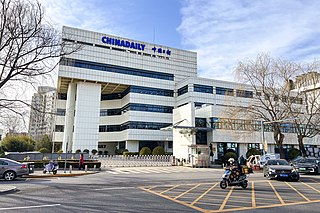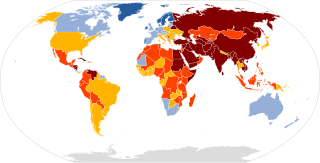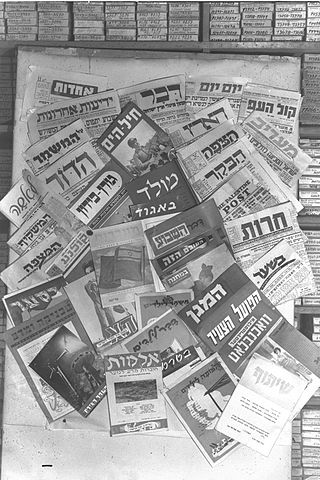Related Research Articles

A journalist is a person who gathers information in the form of text, audio or pictures, processes it into a newsworthy form and disseminates it to the public. This is called journalism.
Freedom of the press or freedom of the media is the fundamental principle that communication and expression through various media, including printed and electronic media, especially published materials, should be considered a right to be exercised freely. Such freedom implies the absence of interference from an overreaching state; its preservation may be sought through a constitution or other legal protection and security. It is in opposition to paid press, where communities, police organizations, and governments are paid for their copyrights.
China censors both the publishing and viewing of online material. Many controversial events are censored from news coverage, preventing many Chinese citizens from knowing about the actions of their government, and severely restricting freedom of the press. China's censorship includes the complete blockage of various websites, apps, and video games, inspiring the policy's nickname, the Great Firewall of China, which blocks websites. Methods used to block websites and pages include DNS spoofing, blocking access to IP addresses, analyzing and filtering URLs, packet inspection, and resetting connections.
The mass media in the People's Republic of China primarily consists of television, newspapers, radio, and magazines. Since the start of the 21st century, the Internet has also emerged as an important form of mass media and is under the direct supervision and control of the Chinese government and ruling Chinese Communist Party (CCP). Media in China is strictly controlled and censored by the CCP, with the main agency that oversees the nation's media being the Central Propaganda Department of the CCP. The largest media organizations, including the China Media Group, the People's Daily, and the Xinhua News Agency, are all controlled by the CCP.

Xinhua News Agency, or New China News Agency, is the official state news agency of the People's Republic of China. It is a State Council's ministry-level institution, and was founded in 1931. It is the largest media organ in China.

Reporters Without Borders is an international non-profit and non-governmental organization headquartered in Paris, which focuses on safeguarding the right to freedom of information. It describes its advocacy as founded on the belief that everyone requires access to the news and information, in line with Article 19 of the Universal Declaration of Human Rights that recognises the right to receive and share information regardless of frontiers, along with other international rights charters. RSF has consultative status at the United Nations, UNESCO, the Council of Europe, and the International Organisation of the Francophonie.

China Daily is an English-language daily newspaper owned by the Publicity Department of the Chinese Communist Party.

Propaganda in China is used by the ruling Chinese Communist Party (CCP), and historically by the Kuomintang (KMT), to sway domestic and international opinion in favor of its policies. Domestically, this includes censorship of proscribed views and an active promotion of views that favor the government. Propaganda is considered central to the operation of the CCP and the Chinese government, with propaganda operations in the country being directed by the CCP's Central Propaganda Department.
Censorship in the People's Republic of China (PRC) is mandated by the country's ruling party, the Chinese Communist Party (CCP). It is one of the strictest censorship regimes in the world. The government censors content for mainly political reasons, such as curtailing political opposition, and censoring events unfavorable to the CCP, such as the 1989 Tiananmen Square protests and massacre, pro-democracy movements in China, the persecution of Uyghurs in China, human rights in Tibet, Falun Gong, pro-democracy protests in Hong Kong, and aspects of the COVID-19 pandemic. Since Xi Jinping became the general secretary of the Chinese Communist Party in 2012, censorship has been "significantly stepped up".

The World Press Freedom Index (WPFI) is an annual ranking of countries compiled and published by Reporters Without Borders (RSF) since 2002 based upon the non-governmental organization's own assessment of the countries' press freedom records in the previous year. It intends to reflect the degree of freedom that journalists, news organizations, and netizens have in each country, and the efforts made by authorities to respect this freedom. Reporters Without Borders is careful to note that the WPFI only deals with press freedom and does not measure the quality of journalism in the countries it assesses, nor does it look at human rights violations in general.

There are over ten different languages in the Israeli media, with Hebrew as the predominant one. Press in Arabic caters to the Arab citizens of Israel, with readers from areas including those governed by the Palestinian National Authority. During the eighties and nineties, the Israeli press underwent a process of significant change as the media gradually came to be controlled by a limited number of organizations, whereas the papers published by political parties began to disappear. Today, three large, privately owned conglomerates based in Tel Aviv dominate the mass media in Israel.
North Korea ranks among some of the most extreme censorship in the world, with the government able to take strict control over communications. North Korea sits at one of the lowest places of Reporters Without Borders' 2024 Press Freedom Index, ranking 177 out of the 180 countries investigated.

The mass media in Syria consists primarily of television, radio, Internet, film and print. The national language of Syria is Arabic but some publications and broadcasts are also available in English and French. While television is the most popular medium in Syria, the Internet has become a widely utilized vehicle to disseminate content. Transcending all available media, the government seeks to control what Syrians see by restricting coverage from outside sources. Publications and broadcasts are monitored by members of the government. All mass media outlets are under the supervision of the Ministry of Information. Third article of the 2013 Information Ministry guidelines stipulate that purpose of all media outlets is "to enlighten public opinion" in line with the ideological doctrines "of the Arab Socialist Ba’ath Party and the policy of the state".

Media in Uzbekistan is currently being censored to an extent. Although a government decree officially eliminated state censorship in 2002, it has continued to severely restrict independent journalism, particularly following the Andijon uprising of 2005. Licensing and regulation are the purview of the State Press Committee and the Inter-Agency Coordination Committee, which use their authority to harass and delay the activities of independent media outlets. In late 2006, authorities further tightened state control by requiring re-registration by all media outlets not passing a summary review of qualifications. In 2005 some 30 to 40 independent television stations and seven independent radio stations were in operation, but four state-owned television stations, run by the Television and Radio Company of Uzbekistan, dominated the market. No live programming is allowed.

The Global Times is a daily tabloid newspaper under the auspices of the Chinese Communist Party's flagship newspaper, the People's Daily, commenting on international issues from a Chinese nationalistic perspective. The publication is sometimes called "China's Fox News" for its propaganda and the monetization of nationalism.

Ukraine was in 96th place out of 180 countries listed in the 2020 World Press Freedom Index, having returned to top 100 of this list for the first time since 2009, but dropped down one spot to 97th place in 2021, being characterized as being in a "difficult situation".
China Global Television Network (CGTN) is one of three branches of state-run China Media Group and the international division of China Central Television (CCTV). Headquartered in Beijing, CGTN broadcasts news in multiple languages. CGTN is under the control of the Central Propaganda Department of the Chinese Communist Party.

Xi Jinping Thought on Socialism with Chinese Characteristics for a New Era, commonly abbreviated outside China as Xi Jinping Thought, is an ideological doctrine created during General Secretary Xi Jinping's leadership of the Chinese Communist Party (CCP) that combines Chinese Marxism and national rejuvenation. According to the CCP, Xi Jinping Thought "builds on and further enriches" previous party ideologies and has also been called as the "Marxism of contemporary China and of the 21st century". The theory's main elements are summarized in the ten affirmations, the fourteen commitments, and the thirteen areas of achievements.
Chinese censorship abroad refers to extraterritorial censorship by the government of the People's Republic of China, i.e. censorship that is conducted beyond China's own borders. The censorship can be applied to both Chinese expatriates and foreign groups. Sensitive topics that have been censored include the political status of Taiwan, human rights in Tibet, Xinjiang internment camps, the persecution of Uyghurs in China, the 1989 Tiananmen Square protests and massacre, the 2019–2020 Hong Kong protests, the COVID-19 pandemic in mainland China, the PRC government's COVID-19 pandemic response, the persecution of Falun Gong, and more general issues related to human rights and democracy in China.

The Uncensored Library is a Minecraft server and map released by Reporters Without Borders (RSF) and created by BlockWorks, DDB Berlin, and .monks as an attempt to circumvent censorship in countries without freedom of the press. The library contains banned reporting from Mexico, Russia, Vietnam, Saudi Arabia, Egypt, Brazil, and Eritrea. An entire wing is given to each country, each containing several banned articles. The library was released on March 12, 2020, the World Day Against Cyber Censorship. The two ways to access the library are to download a map from the official website, or to connect to their Minecraft server.
References
- 1 2 3 4 5 "China". Reporters Without Borders. 23 May 2023. Archived from the original on 19 June 2022. Retrieved 22 June 2022.
- ↑ "China's pressure and propaganda - the reality of reporting Xinjiang". BBC News. 15 January 2021. Archived from the original on 5 September 2021. Retrieved 8 March 2021.
- ↑ Schlesinger, David; Henochowicz, Anne; Wang, Yaqiu (17 March 2016). "Why Xi Jinping's Media Controls Are 'Absolutely Unyielding'". Foreign Policy . Archived from the original on 10 April 2021. Retrieved 10 March 2021.
- ↑ "2020 World Press Freedom Index: "Entering a decisive decade for journalism, exacerbated by coronavirus" | RSF". rsf.org. 19 April 2020. Retrieved 17 June 2024.
- 1 2 3 Zhang, Laney (8 June 2019). "Limits on Freedom of Expression". Library of Congress . Archived from the original on 1 June 2023. Retrieved 20 January 2024.
- 1 2 Russo, Alessandro (2020). Cultural Revolution and Revolutionary Culture. Durham: Duke University Press. p. 148. doi:10.2307/j.ctv15kxg2d. ISBN 978-1-4780-1218-4. JSTOR j.ctv15kxg2d. OCLC 1156439609.
- ↑ "How China trains its journalists to report "correctly"" . The Economist . 20 July 2023. ISSN 0013-0613. Archived from the original on 21 July 2023. Retrieved 21 July 2023.
- ↑ "China : Even tighter control". Reporters Without Borders . 23 May 2023. Archived from the original on 31 March 2019. Retrieved 8 March 2021.
- ↑ "China is the world's worst jailer of journalists, CPJ says". Radio Free Asia . 19 January 2024. Archived from the original on 20 January 2024. Retrieved 20 January 2024.
- ↑ "One Country, One Censor: How China undermines media freedom in Hong Kong and Taiwan". Committee to Protect Journalists . 16 December 2019. Archived from the original on 8 March 2021. Retrieved 8 March 2021.
- ↑ "Press Freedom Continues to Face Setbacks in China". Voice of America . 3 May 2019. Archived from the original on 8 December 2022. Retrieved 20 January 2024.
- ↑ "How China is limiting freedom of the press in Hong Kong". PBS NewsHour. 10 August 2020. Archived from the original on 11 August 2020. Retrieved 8 March 2021.
- ↑ "Wikipedia blocked in China in all languages". BBC News . 14 May 2019. Archived from the original on 15 May 2019. Retrieved 8 March 2021.
- ↑ "China Gets Worst Ever Score in Global Press-Freedom Survey". Time . 28 April 2016. Archived from the original on 14 March 2021. Retrieved 20 January 2024.